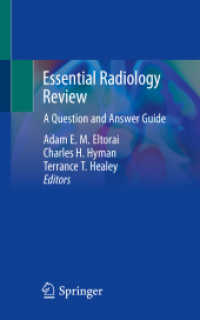- ホーム
- > 洋書
- > 英文書
- > Religion / Ethics
Full Description
This book is a scholarly examination of the political thought of Rabbi Meir (Maharam) of Rothenburg, the most important thirteenth century German Rabbi who was associated with the Pietist movement of the period. From the Maharam's responsa on community matters, a coherent political thought emerges that exercised nearly unprecedented influence on European Jewish communities up to the Jewish Emancipation. Rabbi Meir's extremely sophisticated attempt to balance the demands of the community against those of the individual was facilitated by a characteristic three-tiered structure to his political thought: concrete legal rules supported by value-laden legal principles built upon his general religious ideology. Through a systematic analysis of the Maharam's political thought, Isaac Lifshitz offers an original contribution to Jewish studies, political theory, and the study of legal philosophy. By considering the legal and theological underpinnings of one of Medieval Jewry's most influential figures, it also makes a contribution to the history of ideas in the Medieval period.
Contents
Part I. Introduction: 1. Framing the discussion: overview of the literature; 2. Methodology: identifying the relevant texts; 3. Methodology: Halakha and Agada - laws, principles, and ideology; 4. Overview of the book; Part II. Historical Background: 5. R. Meir of Rothenburg and his teachers and students; 6. The history of the Jewish people and Jewish communities in Germany and Northern France (1000-1300); 7. The development of Talmudic exegesis in Germany and Northern France (1000-1300); 8. Highlights of R. Meir's biography; 9. D. R. Meir's Halakhic approach; 10. Political theory in Germany and Northern France (1000-1300); Part III. Politics as Private Interest: 11. Community as partnership; 12. The role of custom in monetary laws; 13. Beyond partnership: the community as corporation; Part IV. The Sacred Nature of the Political Sphere: 14. The common good; 15. Majority-rule; 16. Agency and representation; 17. The theological definition of community; Part V. Conclusion: 18. Politics as extra-legal activity: ambiguity in R. Meir's works; 19. The theology of unity and despotism.






